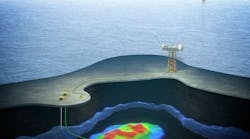Maureen Lorenzetti
The International Monetary Fund recently scrutinized the economies of two key oil exporters, Nigeria and Kuwait. Both governments, like most other members of the Organization of Petroleum Exporting Countries, rely heavily on petroleum export revenue.
IMF went over each country's books as part of bilateral discussions it tries to hold with members every year. The new findings reveal stark differences in the way oil keeps petrodollar-dependent economies afloat.
Kuwait
Kuwait currently appears to be successfully shielding itself from unsettled world oil prices, according to IMF's Executive Board. It commended Kuwait for what they called "continued pursuit" of prudent fiscal and open monetary policies.
"These policies have resulted in a strong macroeconomic position and are characterized by large fiscal and external current account surpluses, a stable financial system, and low inflation, despite wide fluctuations in global oil prices and a difficult external environment."
While the economic picture is stable now, directors cautioned that the Kuwaiti economy still faces challenges down the road.
Fiscal and current account surpluses, while still sizeable, are expected to decline over time and remain vulnerable to the vagaries of world oil prices, IMF cautioned. And as in Saudi Arabia, a rapidly growing population may generate unemployment pressures in Kuwait if nonoil growth is subdued.
IMF directors, however, said they were encouraged that Kuwait is addressing these emerging challenges. The government is promoting nonoil growth through structural reforms to increase the role of the private sector and foreign direct investment, IMF said. This will further deepen and widen the financial sector and improve labor market performance, the report said. IMF also "generally" supports the Central Bank of Kuwait's decision to peg its currency to the US dollar.
Nigeria
The outlook for Nigeria, a fellow OPEC member and important US oil supplier, is far less encouraging. "The current expansionary fiscal stance is particularly troublesome in the context of historically high oil prices," IMF said. "An expansionary fiscal policy, lower reserves, rising domestic short-term debt, and a weak banking system raise Nigeria's vulnerability," the report said.
IMF noted that although nonoil growth in gross domestic product was expected to grow significantly in 2002, overall growth was projected to be negative, reflecting lower oil production aimed at meeting reduced OPEC quotas.
The immediate challenge is to arrest growing macroeconomic instability, but larger quotas won't solve the country's problems, IMF suggested. For 2003 and in the medium term, a strengthening of Nigeria's fiscal policies is needed. One way government officials could repair chronic instability is to create a fiscal rule based on a benchmark oil price. That way public expenditures could be stabilized even when oil prices aren't, IMF said.
The budget process also needs to be reformed, and policymakers should strengthen transparency and accountability in all government fiscal operations.
The country could also see its economy improve if it reformed its trade policies and accelerated privatization with no political interference, IMF said.

